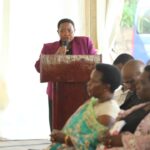Mityana South MP Richard Lumu has announced plans to consult the National Unity Platform (NUP) on his proposed Administration of Parliament Amendment Bill, which seeks to change how the Leader of the Opposition is selected. The bill could shift the power from the main opposition party to the MPs themselves.
The story focuses on the potential impact of MP Lumu’s proposal to democratize the selection process of the Leader of the Opposition. The angle explores the implications for party dynamics within Uganda’s opposition, particularly how this shift could alter the balance of power within the opposition bloc.
Mityana South MP Richard Lumu is taking steps to reshape Uganda’s political landscape with his proposed Administration of Parliament Amendment Bill, which seeks to change how the Leader of the Opposition (LoP) is elected. Currently, the position is filled by the main opposition party’s choice, but Lumu’s bill advocates for a more democratic approach, where MPs themselves would elect the LoP.
During a recent interview with journalists at Parliament, Lumu disclosed his intentions to meet with leaders of the National Unity Platform (NUP), the party with the largest opposition representation, to gather their views on his proposal. “On Friday, I will go to NUP, just in case they confirm because I wrote to them. They haven’t yet confirmed,” Lumu stated. He emphasized the importance of consulting NUP due to its significant influence in Parliament.
Lumu has already engaged with other political entities, including the Uganda People’s Congress (UPC), which has expressed opposition to the bill, favoring the current system. “UPC opposed the proposal and wants the status quo to be maintained,” Lumu revealed, highlighting the divisive nature of the proposed amendment.
The Democratic Party (DP) MP also mentioned ongoing consultations with other stakeholders, including political parties. He was scheduled to meet with DP officials but was advised to reschedule the meeting to Wednesday, September 11, 2024. Additionally, he is set to consult with the People’s Progressive Party Secretariat tomorrow.
Lumu’s initiative has sparked debate across the political spectrum, as it challenges the traditional power dynamics within Uganda’s opposition. If successful, the amendment could lead to a more participatory selection process for the Leader of the Opposition, potentially weakening the control of major parties over key parliamentary roles.
As consultations continue, the proposal’s reception among NUP leaders will be crucial in determining its future. Lumu’s efforts to engage various political parties underscore the bill’s significance and the potential shift it represents in Uganda’s parliamentary politics.



